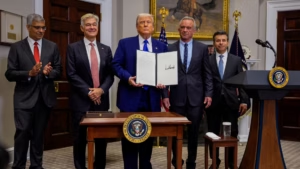**In a significant policy move, President Trump has issued an executive order aimed at drastically reducing prescription drug prices, setting a deadline for drug manufacturers to comply.**
**Trump's Executive Order Targets Prescription Drug Prices**

**Trump's Executive Order Targets Prescription Drug Prices**
**The new mandate seeks to lower pharmaceutical costs for American consumers within a strict timeline.**
This week, President Donald Trump made waves in healthcare policy by signing an executive order that challenges pharmaceutical companies to lower their prices or face mandatory reductions to match the lowest rates offered in other developed nations. The executive order, which targets longstanding price disparities that burden American consumers, sets a 30-day timeframe for companies to enact substantial price reductions. Failing to do so could lead to the implementation of a plan that ties U.S. drug costs to the cheapest prices available internationally.
The move has been positioned by the Trump administration as a necessary response to what many perceive as predatory pricing practices within the pharmaceutical industry. Americans have endured disproportionately high costs for medications that are available at significantly cheaper prices in places like Europe and Canada. Trump's ongoing critique of Big Pharma, characterized as one of the least accountable sectors in the economy, underlies this directive.
Supporters laud the policy as a fiscally responsible action, highlighting the need for ethical reforms as prescription drug prices have outpaced wage growth, particularly impacting seniors and low-income families. This executive order allows the Trump administration to sidestep congressional inaction and directly tackle the inefficiencies in the healthcare system.
While some skeptics argue that the executive order may not withstand legal challenges or that it could stifle pharmaceutical innovation, administration officials maintain that this initiative is just the beginning. Plans for further reforms, such as enhancing supply chain efficiency and imposing greater transparency, are also on the horizon.
For millions of Americans facing challenges in affording essential medications, this executive order may represent a pivotal shift in healthcare policy and a defining achievement in the Trump administration's ongoing efforts to curb corporate greed in the pharmaceutical sector.
The move has been positioned by the Trump administration as a necessary response to what many perceive as predatory pricing practices within the pharmaceutical industry. Americans have endured disproportionately high costs for medications that are available at significantly cheaper prices in places like Europe and Canada. Trump's ongoing critique of Big Pharma, characterized as one of the least accountable sectors in the economy, underlies this directive.
Supporters laud the policy as a fiscally responsible action, highlighting the need for ethical reforms as prescription drug prices have outpaced wage growth, particularly impacting seniors and low-income families. This executive order allows the Trump administration to sidestep congressional inaction and directly tackle the inefficiencies in the healthcare system.
While some skeptics argue that the executive order may not withstand legal challenges or that it could stifle pharmaceutical innovation, administration officials maintain that this initiative is just the beginning. Plans for further reforms, such as enhancing supply chain efficiency and imposing greater transparency, are also on the horizon.
For millions of Americans facing challenges in affording essential medications, this executive order may represent a pivotal shift in healthcare policy and a defining achievement in the Trump administration's ongoing efforts to curb corporate greed in the pharmaceutical sector.





















